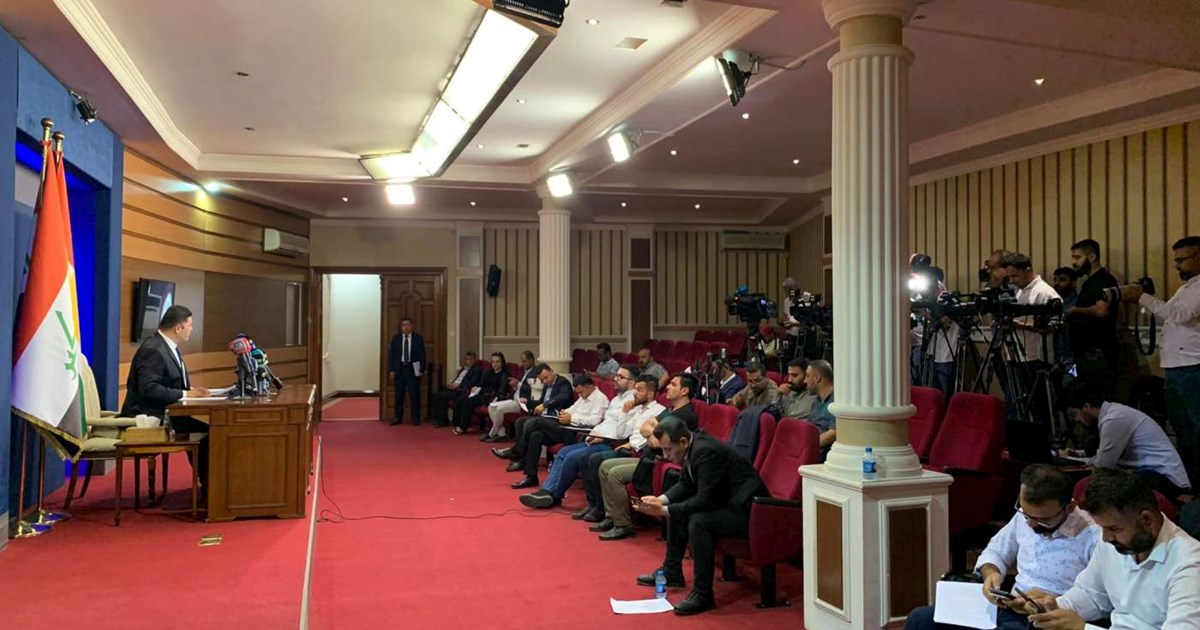The OCIA responds to US Department of State's Report on Human Rights Practices

July 20, 2022
Erbil, Kurdistan Region, Iraq (GOV.KRD) - The Head of the Office of KRG’s Coordinator for International Advocacy, Dr. Dindar Zebari, on Wednesday held a press conference in Erbil to highlight the content of the US State Department's Annual report Human Rights Practices in Iraq for 2021, as well as presenting the government's practical steps regarding its observations within a thorough clarification report prepared by the KRG Office of the Coordinator for International Advocacy (OCIA).
In his opening remarks, the KRG Coordinator referred to the coordination between OCIA and the US Consulate General in Erbil and stated that "our relations with the US Consulate General are consolidated on the basis of partnership and coordination. Prior to the release of US Department of State's reports, OCIA receives comprehensive questionnaires to which it provides thorough responses that reflect government's take on various human rights' topics. Our office consults with relevant government agencies and makes the KRG's response report available to international counterparts and the public after the US State Department reports are issued. For the report in question, OCIA finalized its report in the beginning of June and shared it with the US Consulate General.”
Dr. Dindar Zebari then referred to several topics underlined in OCIA's follow-up report and said, “The steps for implementing the regional plan have been circulated across KRG institutions by a decree No. 6900 on May 12, 2022 from the Secretariat of the Council of Ministers. This circulation defines the responsibility of each institution in implementing the plan. The plan reflects the ninth cabinet’s strategy for institutional reform. The Regional Plan addresses all the themes covered in the US annual report and outlines a roadmap for human rights reform and solutions.”
The KRG Coordinator also noted that each topic in the OCIA's clarifications are enriched with the provisions of the Regional Plan; obstacles and mechanisms for their removal are presented accordingly.
With regards to the attacks carried out by ISIS terrorists in the disputed areas, Zebari stated that "more than 283 ISIS terrorist acts were recorded in the disputed areas from January 2021 to April 2022, which collectively resulted in 399 martyrs, 539 wounded individuals, and 40 abductions. The types of incursions terrorists utilized included affirmative attacks, ambush, suicide bombings, body-trapped vehicle and motorcycle, IED (improvised explosive device), fake checkpoints, rockets, mortars, and abductions."
Concerning the clashes and bombardments on the KRI borders, the KRG Coordinator stated that "The incursions and encounters have caused mass displacements and instability. Between January 2021 and April 2022, there were 138 airstrikes, 214 artillery shells, and 7 boots-on-the-ground and helicopter operations by the neighboring countries."
As far as prison management is concerned, Zebari stated, local and international counterparts have had access to detention facilities in order to monitor the adherence to human rights principles. In 2021, 85 visits were carried out to the detention facilities under the jurisdiction of the KRG Ministry of Interior. Local civil society organizations, the Independent Commission of Human Rights, UNAMI, and the International Committee of the Red Cross (ICRC) paid regular visits.
In respect of freedom of expression, the KRG Coordinator said that "There are 8,000 journalists registered in the Kurdistan Journalist Syndicate (KJS). There are at least 1,000 individuals who are practicing journalism without membership of the syndicate. In the past 20 year, 1,259 digital and press media obtained license: 50 websites, 138 radio stations, 958 newspapers and magazines, 31 satellite channels, and 85 local broadcast stations. Taking this figure into consideration, we can infer that out of every 778 citizens of the Kurdistan Region, one of them is a journalist. Moreover, every group of 4,901 citizens is equivalent to one electronic or press media. The judicial authorities are following up on allegations of torture against journalists, of which number of lawsuits have been filed, and 31 individuals were fined for using violence against journalists, and several similar cases were investigated in this respect."
In his final remarks, the KRG Advocacy Coordinator asserted that KRG takes into account the observation of the US State Department and will follow-up on them. He also emphasized that OCIA's follow-up report focused on the KRG's practical steps on the topics addressed in aforementioned report.
